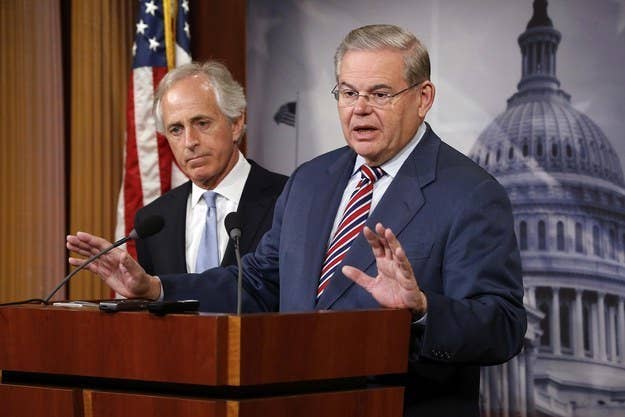
WASHINGTON — Defense officials would not say when the sweeping — and still active — military authorization law passed after the September 11th terrorist attacks would be changed at a contentious Senate hearing Wednesday.
The contentious Senate Foreign Relations Committee hearing frustrated both Democrats and Republicans, as different groups have started working to either repeal the law or broaden AUMF, a 60-word law passed after 9/11 that grants a wide range of authority to attack enemies abroad, would effect various current and hypothetical military operations — from the U.S. presence in Afghanistan, to Benghazi, to Guantanamo Bay.
President Obama has previously said he supports an eventual repeal of the AUMF.
On Wednesday, that message was not as broad.
When asked directly if Obama would support a bill to repeal the 2001 AUMF if presented with the issue today or tomorrow, Stephen Preston, the general counsel for the Department of Defense, said, "We did not come here this morning equipped to answer that question."
"We're not here to say it should be repealed today, although it's clear that that is the president's ultimate goal," added State Department Deputy Legal Adviser Mary Mcleod.
McIeod said the Obama administration supports a repeal of the 2002 AUMF for Iraq, where the U.S. combat mission has been over since 2010. But she reiterated the administration's ability to prosecute terrorism on an individual basis.
"The U.S. has the authority to target individuals, including Americans, who pose an imminent threat to attack our country," she said.
Preston said that a "good deal" of what will happen to the AUMF is predicated on the Afghan presidential election. U.S. negotiators have been unable to reach agreements with the administration of Hamid Karzai, the current president, over U.S. troop levels in the country.
Tennessee Republican Sen. Bob Corker balked at Preston's answer, calling it "bogus."
"That last statement about waiting to see what we're going to do in Afghanistan after this presidential election is one of the most bogus, lacking in substance comments I have ever heard before this committee," said Corker, the ranking member on the committee.
Mcleod and Preston's testimony emphasized the White House belief that in many circumstances, even if there were no AUMF, Obama has the Constitutional authority to engage in military actions abroad without the consent of Congress.
The line of reasoning prompted questions about whether the AUMF is even necessary. On some level, Preston said, it isn't.
"I think it would be fair to say that with or without an AUMF, to the extent that it grants authority for use of military force against al Qaeda, and the Taliban, and associated forces in which we're in armed conflict...the president does have constitutional authority to act," Preston said. "The point is these two sources of authority are not, and I don't think were ever intended to be, mutually exclusive."
Because AUMF is so broad, changes to the law could affect a number of core, controversial national security efforts — producing various lines of questioning on Wednesday
Republican Sen. John McCain asked Mcleod and Preston if the U.S. would be able to attack those responsible for the Benghazi attacks under the AUMF. Preston said that hadn't been determined, though those who carried out the attacks are classified as terrorists.
McCain then asked if the AUMF were repealed, would Guantanamo Bay be closed down? "I think that is a critical issue that is in the mix," Preston said as McCain scoffed.
Sen. Chris Murphy asked if a nation harbors terrorists, but isn't a direct threat to the U.S., whether the president would need congressional approval to attack that country. Again the answer was indeterminate. "We would have to think about whether individuals in that state or in the government of that state actually posed an imminent threat," Mcleod said.
Committee Chairman Bob Menendez asked if the president wanted to use military action in Syria after the chemical attacks, would he have needed Congress' approval? Mcleod pivoted to the fact that he didn't end up doing that, but said she thought Obama did in fact have the authority to act without Congress.
"That's not an imminent threat to the U.S. as far as I can tell," Menendez said. "This is where we need to define what is the standard."
A measure in the House to repeal the AUMF is scheduled to be debated soon.
